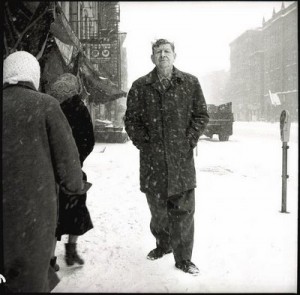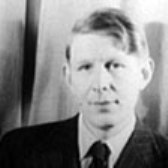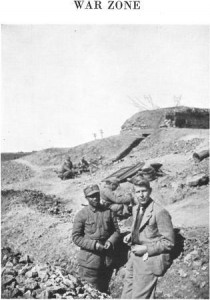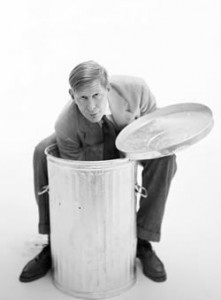
As we discussed briefly in class the other day, Auden’s arrival in NYC in January of 1939 marked a major transition in his life and work. His departure from England, where he was an important public persona, came at a time when Europe was on the brink of war, and it was regarded by many of his countryman as a betrayal. In addition, his journey to New York corresponded with a major shift in Auden’s political attitudes and his ideas about the role of poetry. To oversimplify, when he left England for New York, Auden also left behind the broadly Marxian and Freudian attitudes that informed his early work, as well as his sense that the poet had a responsibility to speak on the important issues of the day to a national audience with which he had a deep and intimate connnection. The book he published shortly before leaving for the U.S. was called* On this Island. The title referred to Auden’s identification with England as a cohesive, island nation with deep cultural traditions.
(This short book review by Adam Kirsch gives a good sense of this transition. For a deeper explanation of what the move to New York meant for Auden, see Nicholas Jenkin’s superb essay on “Auden in America.”)

When Auden left for New York, in other words, he left behind a role as a public spokesman for a nation with which he had powerful connections, choosing to become an exile. “It is my vocation,” he wrote a friend in 1940, “to be a Wandering Jew.” His aim, he told another friend in that same year, was “to live deliberately without roots.”

New York suited Auden’s new attitude because–especially in the artistic and intellectual circles in which he travelled–it was a city of exiles. But, it also seemed to him in this way representative of the United States more generally, which he viewed as a kind of polar opposite to the island nation of England. America, in his view, was a society that lacked a profoundly rooted and coherent culture. In this way, in turn, New York and the U.S. seemed to Auden the truest face of the modern world that was to emerge from the wreckage of WWII. In the poem “Ischia,” which he wrote in 1948, he referred to New York as one of “soiled productive cities” that characterized the modern world.
As he adopted the perspective of an exile, Auden’s poetic emphasis changed in some of the ways we began to discuss in class on Weds–shifting from an emphasis on the political to the spiritual and from a stress on public communication to an emphasis on private experience. Among other things, as we noted in class, Auden developed an intense concern about the danger of collectivism of all kinds–including the kind that might be seen in nationalism–and a defense against it of personal conscience and of the kinds of social relations that could exist among small groups of people.
This broad transition is evident in all of the poems that we’ve been considering and is addressed directly by some of them. “Under Which Lyre,” for example is a kind of joking statement of Auden’s new credo. Auden delivered it as a Phi Beta Kappa address at Harvard in 1948, which, as it was then presided over by James Bryant Conant (an important figure in the development of the Manhattan project and, as Nicholas Lemann pointed out in his lecture at the Center for the Humanities, the intellectual godfather of postwar American higher education) seemed to Auden a good representative of the dangerous tendencies of the modern world–collectivism, rationalism, an avowed dedication to the public good which concealed a dehumanizing will to power, and bad taste in art. In effect, Auden’s poem was a witty rebuke to the hosts at Harvard who were honoring him and a plea to his audience that they follow him in trying to live as intellectual exiles from a devouring public culture. (To understand this poem, it helps to understand that Auden sets up Apollo and Hermes as the representatives of two, alternative dispensations. Apollo stands for the dangerous public rationality that Auden saw in Conant; Hermes–the messenger and patron of travellers, thieves, and wits–stands for the sly individuals who resist Apollo’s impositions.)
(You can find a recording of Auden reading “Under Which Lyre” in this blog post.)
Of course, as Auden knew, there was something quite paradoxical about all this. He achieved great public renown in the U.S as a poet who was suspicious of public power, and he led a very active life as a teacher, orator, journalist, editorialist, and moralist who, in effect, often found himself lecturing his audiences about the attitudes he thought they should take. (Truman Capote, for one, thought this stance made Auden a terrible bore.) What’s more, despite his stated opposition to the big powers of his world, Auden’s stance won the day. He is important to us because of the intrinsic interest of his work, but also because he helped to bring about a broader transformation in the cultural life of New York City and, ultimately, of the U.S.
One way to describe this transformation would be to say that Auden was an important figure in the importation of existentialism to American shores. During the 1940s, he became a leading figure in the vogue for the nineteenth-century Christian existentialist theologian Soren Kierkegaard. (He was much less sympathetic to the French existentialists Sartre and de Beauvoir.) Kierkegaard became for Auden and others a master thinker who could battle the influence of Marx and Freud. In Auden’s view, Kierkegaard had the best account of the spiritual experience of modern life—which was, in short, to live with anxiety. Modern “man” (the term characteristically used in the period) was, as Auden put it in his description of Kierkegaard, “fated to be an exception and a sufferer.”

As we continue on to read Trilling and McCarthy, we should keep an eye out for the way their attitudes and the narratives they construct resemble what we see in Auden.
In the meantime, a few words about “Memorial for the City,” which I asked you to read carefully for Monday. To understand “Memorial,” it helps to have a handle on some of the very compressed references Auden makes in that poem. Three points in particular are useful:
1) When Auden uses the word “city,” he’s employing it in to mean (as the opposite of “nature”) human civilization in general.
2) In the first two sections of the poem, Auden gives us a very compressed verson of a grand theory of history which takes us from the Greece of the Illiad and Odyssey (where people allegedly saw as the crow and camera do–without a sense of moral judgment or historical time) through numerous stages in the history of the modern world. Those stages are as follows:
(a) “the New City” which is created with the birth of Christendom and the split that results between religious and secular authority;
(b) the “Sane City” of the Renaissance in which a balanced human civilization briefly flourished in the context of the city state;
(c) the “Sinful City” which Rome and human society became when Protestantism forced humanity to recognize a gulf between the worldly and the divine;
(d) the “Rational City” of the Enlightenment in which philosophers tried to subject humanity to reason;
(e) the “Glittering City” of the nineteenth century created by imperialism; and
(f), finally, the “Conscious City” of the 20th century in which humanity has confronted the fact that there is a “wild outside” to civilization that in the end cannot be pacified; and
(g) finally, in section III of the poem, the “abolished City” of the postwar world–in which, in effect, civilization has been destroyed by the spread of barbed wire.
All of this is very complicated (and, as history, doubtful), but the important thing to keep in mind is that Auden basically views humanity as driven through stages of development by its need for moral order and by the related effort to control tensions between the worldly and the divine that can never be resolved. Because we don’t see the world as crows and cameras do, we need a moral order. But we’re continually confronted by the irreconciliability of moral order and the world we live in. We’re always trying to get our world under control–intellectually, spiritually, and politically–and that effort, which can never be finally successful and which forces us to ever greater lengths, drives the process of historical change.
3) In section III of the poem, when Auden refers to “our Image” and “Our Weakness” what he’s talking about is our bodies. And in section IV of the poem he has the body speak. The “me” and “I” of that section is, in effect, the voice of the human body relating its response to various historical demands of the mind and spirit. In the final lines, the poem gives us a confrontation between “Metropolis, that too-great city” and the human body. The body wins.
So, there’s an interesting paradox implicit in all this. Auden lived in and loved New York, which enabled the life of exile, but he also viewed the metropolis as the epitome of the dangers of the modern world. In effect, perhaps, two rival visions of the city.
*The book was originally titled Look, Stranger by the publisher, but Auden hated that title and subsequently renamed it with the title he preferred.
